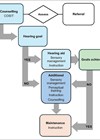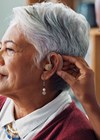The migration of Filipino audiologists and otolaryngologists abroad is worsening the shortage of hearing specialists. Improving local conditions is vital to retaining talent.
As ear and hearing healthcare professionals practising in the Philippines, we have seen the struggle in keeping skilled hearing healthcare professionals within our country. The migration of Filipino audiologists and some otolaryngologists to countries like New Zealand, Australia, and the United States has created a significant ‘brain drain’ that impacts our ability to provide quality care to our local population.
There are fewer than 100 audiologists in the Philippines, serving a population of about 109 million. This number has remained stagnant, partly because the two audiology schools in the Philippines only produce an average of 15 graduates each year and many of these graduates leave within one to two years to permanently migrate to other countries.
To explore this issue, an interview was conducted with Dr Nelson June Balisa, a Filipino otolaryngologist who shifted to audiology after working as a physician for 10 years. He has been a practising audiologist in New Zealand for the last 15 years. His first-hand experience sheds light on why this trend of migration occurred and its impact on occupational hearing healthcare in the Philippines.

Members of the Filipino Audiologists in New Zealand (FANZ) attending the New Zealand Audiological Society
(NZAS) 2024 Conference. Dr Nelson June Balisa is pictured in the top row, fourth from the left.
The allure of overseas opportunities
Dr Balisa explained that the decision to emigrate from the Philippines was not easy but was driven by a combination of factors:
- Higher salaries: “The salaries are a lot more overseas, the quality of life is better and I can take family with me,” he said.
- Professional development: Professional opportunities are generally more abundant in countries such a New Zealand — think recognition, ongoing education and research, career advancement.
- Work-life balance: He emphasised the importance of manageable workloads and better working conditions in his decision to relocate.
The impact on Philippine healthcare
While the benefits for individual practitioners are clear, the exodus of skilled professionals has created significant challenges for the Philippine healthcare system:
- Shortage of hearing specialists: Fewer audiologists and otolaryngologists have meant longer wait times to get an appointment, and management of hearing has become a problem, particularly in rural settings.
- Reduced quality of care: The loss of qualified and experienced professionals means that patients may not always have access to the most expert management.
- Training gaps: As seasoned practitioners leave, the pool of mentors capable of preparing future ear and hearing healthcare professionals is shrinking.
- Economic impact: The investment in education and training of these professionals is essentially lost when they emigrate, representing a considerable financial cost to the country.
Strategies for managing the brain drain
Addressing this problem requires a multifaceted approach. Based on our experience and insights from professionals like Dr Balisa, we propose the following strategies:
- Improve working conditions and compensation: While it is impossible to match Western salaries, direct steps can still be taken in the direction of improving pay scales as well as creating healthier work environments that are more likely to retain professionals.
- Enhance professional development opportunities: More avenues for continued education, research, and career advancement within the Philippines can encourage professionals to stay.
- Implement return service agreements: Requiring professionals to work in local service in exchange for subsidised education can help ensure a steady supply of professionals.
- Cultivate global partnerships: Collaborations with foreign institutions can provide avenues for knowledge exchange without permanent relocation.
- Develop teleaudiology programmes: Leveraging technology to connect rural areas with specialists can help mitigate the impact of professional shortages.
- Invest in technology and facilities: Providing access to modern equipment and resources can make local practice more attractive and improve patient care.
- Encourage temporary returns: Programmes that facilitate short-term returns of expatriate professionals can help transfer knowledge and skills back to the local healthcare system.
The critical need for professional recognition
Among the aforementioned strategies, one imperative stands out as crucial for mitigating the brain drain in Philippine audiology: the formal recognition of audiology as a distinct profession. The most important and urgent step the Philippines must take is to officially recognise audiology as a distinct healthcare profession. This recognition is the foundation upon which all other improvements can be built. Here’s why this is so critical:
- Legal standing: Official recognition provides audiologists with a defined scope of practice and legal protection for their work.
- Educational standards: It allows for the establishment of standardised educational requirements and licensing procedures, ensuring high-quality care.
- Career pathway: Recognition creates a clear career path for aspiring audiologists, encouraging more students to enter the field.
- Improved compensation: With official recognition, audiologists can advocate for fair compensation commensurate with their specialised skills and education.
- Professional development: Recognition facilitates the creation of professional organisations and continuing education opportunities specific to audiology.
- Public awareness: Health organisations should raise public awareness about the importance of hearing health and the role of audiologists.
- Research opportunities: Recognition can lead to increased funding and support for audiology research in the Philippines.
By taking this crucial step, the Philippines can set in motion a positive cycle of change. Official recognition will lead to better compensation and improved opportunities for local professionals, which, in turn, will help stem the tide of migration.
Most Filipino audiologists abroad strongly emphasised the point that if audiology had been recognised as a distinct profession when they were starting their career in the Philippines, they might have stayed. The lack of recognition was a significant factor in their decision to seek opportunities abroad.
The perspective from abroad
Dr Balisa’s migration is a double loss for the Philippines as we lost both an otolaryngologist and an audiologist. He offered valuable insights from his experience working in New Zealand: “While I’ve found great professional satisfaction here, I still feel a solid connection to the Philippines. I stay involved through charity work, collaborations with NGOs and the University of Santo Tomas Audiology initiatives for the indigent and participating in medical missions when possible.”
He suggested that creating more opportunities for expatriate professionals to contribute their expertise back to the Philippines, even remotely, could help bridge the gap caused by migration.
Currently, there are 79 active members of the Filipino Audiologists in New Zealand (FANZ). FANZ is a professional organisation that supports and unites Filipino audiologists working nationwide. The number of members keeps growing as more Filipino audiologists seek opportunities in New Zealand. Most Western countries offer a supportive environment and good career prospects for audiologists. This also highlights the broader trend of healthcare workers from the Philippines contributing to global healthcare systems.
Looking to the future
As we work to address the challenges posed by the migration of ear and hearing healthcare providers, it’s crucial to recognise that this is not just a Philippine issue, but a global one. Developing countries worldwide face similar struggles in retaining healthcare professionals. By implementing targeted strategies and fostering a more attractive professional environment, we can work towards a future where Filipino audiologists and otolaryngologists have compelling reasons to build their careers at home. At the same time, we must also find ways to leverage the expertise of those who have chosen to practise abroad, creating a win-win situation that benefits both our local healthcare system and individual practitioners.
The way forward will require collaboration among the otolaryngology and existing Filipino audiology societies and interest groups, as well as hearing centres and businesses, professional regulatory bodies, healthcare institutions, and professionals both domestically and internationally, to collaborate. By working together, we can guarantee the continuous delivery of high-quality ear and hearing healthcare to all citizens of the Philippines, irrespective of global migration trends.
Further reading
1. 2020 Census of Population and Housing (2020 CPH) Population Counts Declared Official by the President. Philippine Statistics Authority – Republic of the Philippines.
https://psa.gov.ph/content/2020-census-population
-and-housing-2020-cph-population-counts
-declared-official-president
[Last accessed October 2024].
2. Goldenberg SM, Fischer F. Migration and health research: Past, present, and future. BMC Public Health 2023;23(1):1425.
3. New Zealand Audiological Society.
https://audiology.org.nz
4. Siar SV. Skilled Migration, Knowledge Transfer and Development: The Case of the Highly Skilled Filipino Migrants in New Zealand and Australia. J Curr Southeast Asian Aff 2011;30(3):61–94.
Declaration of competing interests: None declared.











